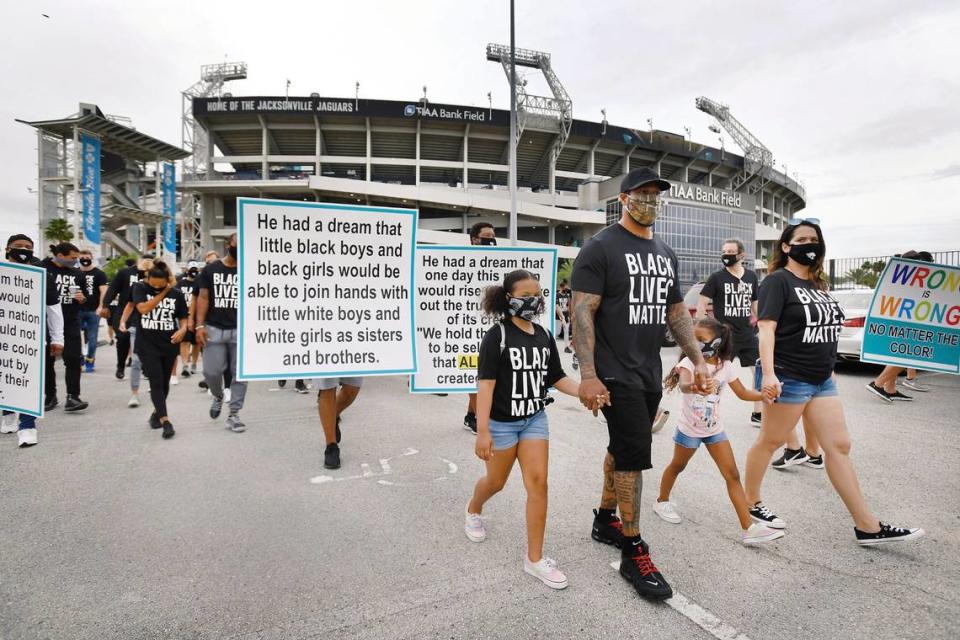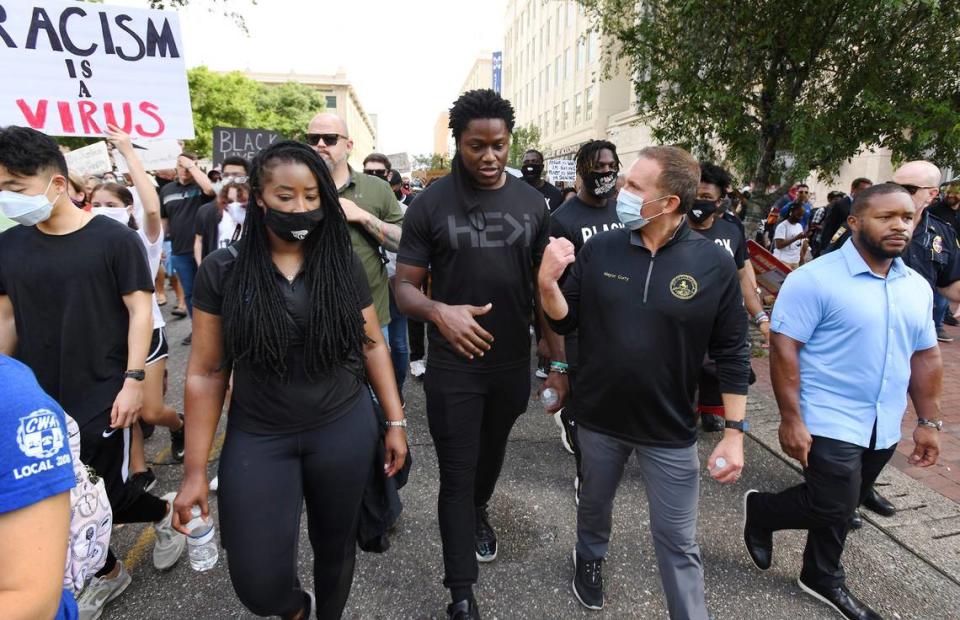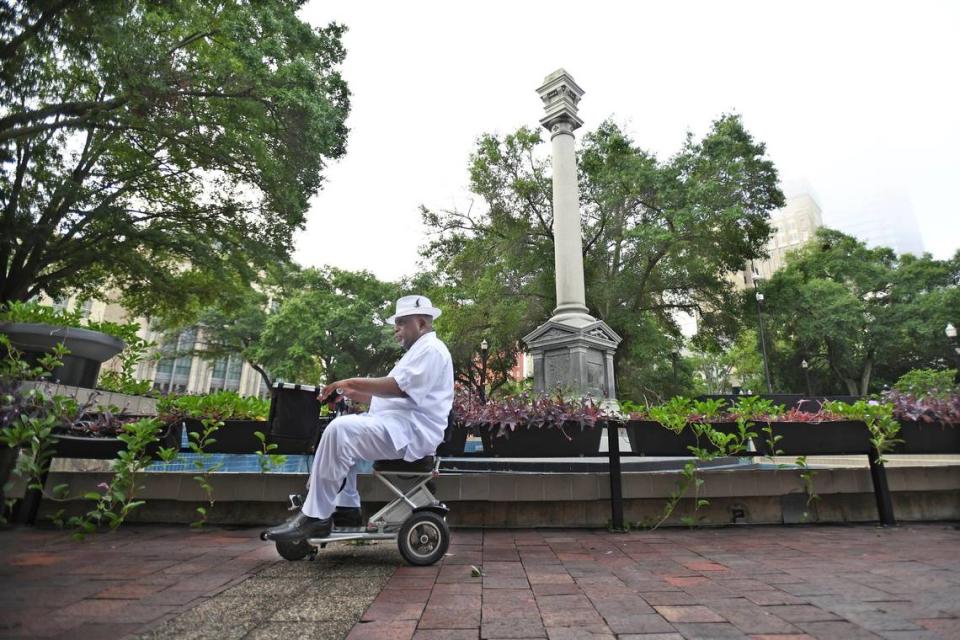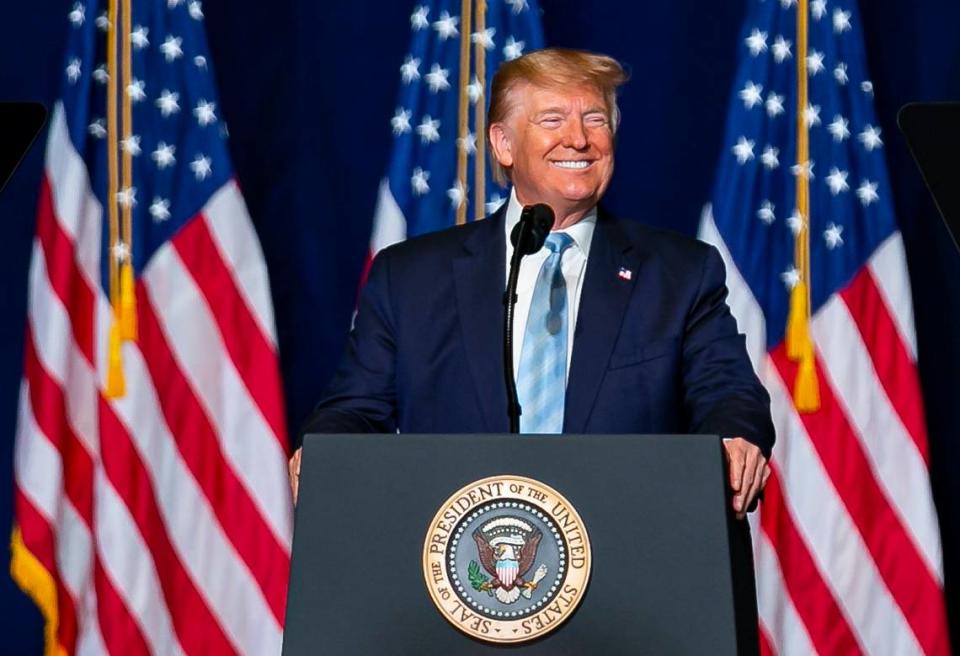Florida Republicans pushed to host Trump’s convention party. They got it. What now?
When President Donald Trump became disenchanted with North Carolina as the host state for the Republican Party’s national summer convention, Florida Republicans campaigned over the phone, on Twitter and aboard Air Force One for the president to come to his home state.
They more or less got what they wanted: The Republican National Committee announced Thursday evening it would move the celebration of Trump’s nomination from Charlotte to Jacksonville — awarding the city a political party that could attract thousands of Republican activists and press from around the world during a pandemic and civil unrest.
“We are thrilled to hold this momentous occasion in the great city of Jacksonville,” RNC Chairwoman Ronna McDaniel said in a statement.
Trump’s decision to move to Jacksonville means he’ll accept his party’s nomination from a swing state, possibly with the kind of crowds that North Carolina’s Democratic governor wouldn’t promise to allow. The sprawling metro area is just south of the Florida-Georgia line, also giving Trump reach into two states where friendly, Republican governors have quickly eased coronavirus restrictions.
Jacksonville is among one of the few true swing counties in Florida, which is itself a presidential swing state that Trump won by little more than 1% in 2016. That year, the metro area voted for Trump by about 6,000 votes, but two years later it swung Democrat in races for governor and U.S. Senate.
“Florida is definitely a battleground state and the bleed-over into Georgia is a potential benefit,” said Justin Sayfie, a Republican lobbyist and former policy adviser to past Florida Gov. Jeb Bush.
It’s official! pic.twitter.com/GvHYq4yH7V
— JAX Mayor 2020 (@2020_jax) June 12, 2020
A website set up by the Jacksonville Host Committee pegs the dates of the event as Aug. 24-27, the same as previously planned in Charlotte.
In announcing the move, the RNC explained Trump would accept the party’s nomination from the Veterans Memorial Arena, a venue with a 15,000-person capacity that normally hosts concerts and indoor football in downtown Jacksonville. The RNC, which has said a full-fledged convention would bring at least $100 million to any host city, blamed the move on North Carolina Gov. Roy Cooper’s unwillingness to provide hard commitments to allow Republican activists to fill out an arena in Charlotte amid the coronavirus pandemic.
“What city would take on the Republican National Convention with just 75 days to pull it off?” Jacksonville Mayor Lenny Curry asked, rhetorically, in a promotional video released Thursday night. “Probably not many. But Jacksonville isn’t just any city.”
But it’s not yet clear what kind of crowds the event will draw in Jacksonville. The convention in Charlotte — which the RNC promised would bring an economic windfall of at least $100 million to local businesses — was initially expected to bring 50,000 or more to the city before the coronavirus pandemic led RNC executive committee members to vote this week to hold a scaled-down event in Charlotte.
Nor did the RNC explain whether it would implement any sanitary or social distancing measures to help prevent the spread of coronavirus.
Florida Gov. Ron DeSantis has not yet publicly offered the same guarantee of a “full-fledged” convention event that Trump and the RNC demanded from Cooper. With about 1 in 20 coronavirus tests returning positive in Florida, and confirmed cases on the rise, Democrats remain uneasy about the arrangement, worried that a large celebration will contribute to the spread of coronavirus.
“Donald Trump abandoned North Carolina because he wants it to look like the threat of the coronavirus is over when he gives his big televised speech,” Florida Democratic Party Chairwoman Terrie Rizzo said Thursday night in a statement. “Unfortunately, optics are not a public health strategy, nor are they a good re-election strategy.”
DeSantis, though, is a close Trump ally. And following an April-long shutdown, he has marketed Florida as open for business, a message that meshes with Trump’s desire to move past the pandemic and talk again about the economy.
The RNC did not announce a date for Trump’s relocated celebration. But potentially elevating the significance of his decision to come to Jacksonville, the final day of the convention — Aug. 27 — falls on the 60th anniversary of Ax Handle Saturday, a 1960 attack on black lunch-counter protesters seen as a tipping point in Jacksonville’s civil rights history and race relations.
Rodney Hurst Sr., an activist and black historian who helped lead the protests at a lunch counter that day through his role on the Jacksonville NAACP’s youth council, said in an interview that a commemoration is planned for Aug. 27 in Hemming Park, where a white mob wielding ax handles gathered before pouncing on peaceful black protesters. He wondered if the timing of Trump’s visit is coincidence given that the president intends to resume large political rallies beginning June 19 — a day commemorating the end of slavery in the U.S. — in Tulsa, Oklahoma, a city where white mobs attacked black families in a deadly riot 99 years ago.
About a third of Jacksonville’s 900,000 residents are black. Early Tuesday, as word spread among GOP circles that the RNC was settling on Jacksonville for its convention festivities, Republican Mayor Lenny Curry ordered city crews to take down a Confederate statue downtown before pledging to a crowd of peaceful protesters that all remaining Confederate statues in the city would also be removed.
But Hurst said Trump’s visit is irrelevant to Jacksonville’s ongoing civil rights movement: “Donald Trump coming to town — America’s racist president — won’t change anything that we’re going to do.”
Herald/Times Tallahassee Bureau Chief Mary Ellen Klas and McClatchy DC reporter Francesca Chambers contributed to this report.



